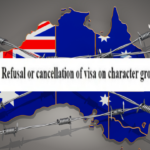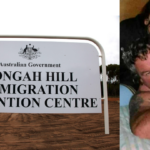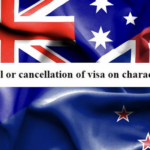Draconian Refugee Deportation Laws Carry All the Hallmarks of Albanese’s Howard Era

The Albanese government released new refugee laws last Tuesday, which seek to ensure that asylum-seeking noncitizens who haven’t obtained refugee status must assist Immigration with their “removal pathway” or otherwise, face serious charging and incarceration.
This can be spruiked to the general public as a fairly rational position, as these noncitizens are seen to have “exhausted all avenues”.
However, what isn’t front and centre is that these people fled their homelands on rickety boats over the ocean to get here, so there was likely a pretty sound reason for their having risked their lives in this manner.
During his second reading speech on the bill, immigration minister Andrew Giles outlined that Fortress Australia is being enhanced, and will now imprison asylum seekers refusing to leave, while most nationals from countries that won’t repatriate, will no longer be provided with visas here.
Last year the High Court ruled that indefinitely detaining noncitizens when there’s no chance of removal is illegal, which then saw around 150 indefinitely detained individuals released, and this new bill seeks to head off another case outcome with potential to see 170 more detainees freed.
Of course, Canberra is well aware that with the escalating military conflicts and climate catastrophes globally, the new laws sprung on the opposition and the crossbench on Tuesday morning, will further serve to stifle the hopes of rising numbers of legitimate refugees on the horizon.
Securing the bigoted vote
“There are currently noncitizens in Australia who have exhausted all visa pathways to stay,” the immigration minister said on introducing the new laws, and he added that these people “refuse to engage with their home county to undertake actions, like applying for a passport”.
In terms other scenarios this involves, the April court case, which is the recognised source requiring the attempt to expedite the passing of these laws, involves a bisexual Faili Kurdish man refusing to assist in his removal to Iran from where he fled, due to his attributes making him a target.
Giles further outlined during his speech that “individuals considered ‘removal pathway noncitizens’ include”, unlawful noncitizens or those without a visa, those with bridging visas with “removal pending” or “general” status, but not those on bridging visas pending an assessment outcome.
The minister said the bill is designed to crackdown on asylum seekers “deliberately and unreasonably impeding or frustrating removal efforts” to return them to where they claim to be under threat, and if noncitizens refuse “other things” requested, they then face prison time.
The bill made it through the lower house without providing nongovernment members any time to contemplate its implications, but it was headed off in the Senate and sent for committee review, with its report not to appear until early May, after, at least, the High Court hearings.
The guts of the bill
The Migration Amendment (Removal and Other Measures) Bill 2024 inserts subdivision d into division 8 part 2 of the Migration Act 1958 (Cth), with new section 199A outlining that the laws reflect Australia’s expectation that noncitizens on the removal pathway leave and assist in measures to facilitate this, and that foreign nations will act accordingly.
The law outlines that “removal pathway noncitizens” can be those on certain bridging visas, those who have been given a protection finding but the minister determines to turf out anyway, although not those with a current visa application.
New section 199C of the Act provides the minister with the power to direct removal pathway noncitizens to sign a passport and travel documents, provide documents and attend interviews, as well as empowering the minister to undertake measures to facilitate the new deportation scheme.
The next section, 199D, outlines when the minister can’t place asylum-seeking noncitizens on the deportation list, which includes when the person has an ongoing visa application, if the individual is under the age of 18 or if they have a matter underway in the courts or tribunals.
The proposed noncompliance with removal pathway direction offence sits under new section 199G, and it captures those not complying with a request to do something to facilitate deportation, and it carries a maximum sentence of 5 years imprisonment and/or a fine of up to $93,900.
And this offence also carries a minimum sentence of at least 12 months prison time.
Section 199F then provides the minister with the power to designate another nation as a “removal concern country” if the minister thinks it in the “national interest”, which, it’s explained elsewhere, means they’re not willing to take back their own nationals that have fled to Australia.
And section 199G provides that noncitizens from a removal country of concern will not be provided with visas, unless the individual is either applying for refugee or humanitarian protection or they’re related to someone here, meaning regular citizens of these nations will be banned from Australia.
In the shadow of Pezzullo
Sydney refugee advocate Jane Salmon explained to Sydney Criminal Lawyers that the experts are pointing to five nations that the Albanese government appears to be targeting for the status of “removal concern country”, which includes Iran, Iraq, South Sudan, Zimbabwe and Russia.
The long-term advocate debunks the idea that the new laws are solely to target those caught up in the High Court appeal involving the Kurdish noncitizen refusing to go lightly back to face persecution in Iran, as the legislation appears much more comprehensive than to merely prevent their release.
Salmon said that rather than “treating irregular arrivals kindly after over a decade of living and working here”, the Albanese government, in a clear attempt to outdo the Coalition on tough border policy, is legislating to deport as many noncitizens as possible.
Former PM Paul Keating criticised foreign minister Penny Wong for simply following Coalition foreign policy in order to placate the conservative vote last year, and 12 months later, it seems that Albanese has followed the Coalition, on AUKUS, Israel, China and now on refugee policy.
According to Greens Senator David Shoebridge, these new laws provide the minister with a blunt instrument which can ultimately see all noncitizens placed on the removal pathway.
“The Albanese Labor government is desperately trying to outflank the Coalition to the right, in a cruel contest they can never win,” the Greens immigration spokesperson said. “Even the Coalition didn’t think of this in their decade of creative cruelty towards refugees and people seeking asylum.
“This is part of an ongoing cruelty agenda from Labor as they are scheming to come up with novel ways to punish and harm people seeking asylum in this country,” Shoebridge made clear in his 26 March statement.







